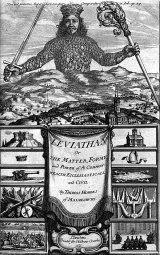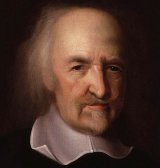Leviathan Page #16
Leviathan or The Matter, Forme and Power of a Common-Wealth Ecclesiasticall and Civil—commonly referred to as Leviathan—is a book written by Thomas Hobbes (1588–1679) and published in 1651 (revised Latin edition 1668). Its name derives from the biblical Leviathan. The work concerns the structure of society and legitimate government, and is regarded as one of the earliest and most influential examples of social contract theory.
(For example,) Though the effect of folly, in them that are possessed of an opinion of being inspired, be not visible alwayes in one man, by any very extravagant action, that proceedeth from such Passion; yet when many of them conspire together, the Rage of the whole multitude is visible enough. For what argument of Madnesse can there be greater, than to clamour, strike, and throw stones at our best friends? Yet this is somewhat lesse than such a multitude will do. For they will clamour, fight against, and destroy those, by whom all their lifetime before, they have been protected, and secured from injury. And if this be Madnesse in the multitude, it is the same in every particular man. For as in the middest of the sea, though a man perceive no sound of that part of the water next him; yet he is well assured, that part contributes as much, to the Roaring of the Sea, as any other part, of the same quantity: so also, thought wee perceive no great unquietnesse, in one, or two men; yet we may be well assured, that their singular Passions, are parts of the Seditious roaring of a troubled Nation. And if there were nothing else that bewrayed their madnesse; yet that very arrogating such inspiration to themselves, is argument enough. If some man in Bedlam should entertaine you with sober discourse; and you desire in taking leave, to know what he were, that you might another time requite his civility; and he should tell you, he were God the Father; I think you need expect no extravagant action for argument of his Madnesse. This opinion of Inspiration, called commonly, Private Spirit, begins very often, from some lucky finding of an Errour generally held by others; and not knowing, or not remembring, by what conduct of reason, they came to so singular a truth, (as they think it, though it be many times an untruth they light on,) they presently admire themselves; as being in the speciall grace of God Almighty, who hath revealed the same to them supernaturally, by his Spirit. Again, that Madnesse is nothing else, but too much appearing Passion, may be gathered out of the effects of Wine, which are the same with those of the evill disposition of the organs. For the variety of behaviour in men that have drunk too much, is the same with that of Mad-men: some of them Raging, others Loving, others laughing, all extravagantly, but according to their severall domineering Passions: For the effect of the wine, does but remove Dissimulation; and take from them the sight of the deformity of their Passions. For, (I believe) the most sober men, when they walk alone without care and employment of the mind, would be unwilling the vanity and Extravagance of their thoughts at that time should be publiquely seen: which is a confession, that Passions unguided, are for the most part meere Madnesse. The opinions of the world, both in antient and later ages, concerning the cause of madnesse, have been two. Some, deriving them from the Passions; some, from Daemons, or Spirits, either good, or bad, which they thought might enter into a man, possesse him, and move his organs is such strange, and uncouth manner, as mad-men use to do. The former sort therefore, called such men, Mad-men: but the Later, called them sometimes Daemoniacks, (that is, possessed with spirits;) sometimes Energumeni, (that is agitated, or moved with spirits;) and now in Italy they are called not onely Pazzi, Mad-men; but also Spiritati, men possest. There was once a great conflux of people in Abdera, a City of the Greeks, at the acting of the Tragedy of Andromeda, upon an extream hot day: whereupon, a great many of the spectators falling into Fevers, had this accident from the heat, and from The Tragedy together, that they did nothing but pronounce Iambiques, with the names of Perseus and Andromeda; which together with the Fever, was cured, by the comming on of Winter: And this madnesse was thought to proceed from the Passion imprinted by the Tragedy. Likewise there raigned a fit of madnesse in another Graecian city, which seized onely the young Maidens; and caused many of them to hang themselves. This was by most then thought an act of the Divel. But one that suspected, that contempt of life in them, might proceed from some Passion of the mind, and supposing they did not contemne also their honour, gave counsell to the Magistrates, to strip such as so hang'd themselves, and let them hang out naked. This the story sayes cured that madnesse. But on the other side, the same Graecians, did often ascribe madnesse, to the operation of the Eumenides, or Furyes; and sometimes of Ceres, Phoebus, and other Gods: so much did men attribute to Phantasmes, as to think them aereal living bodies; and generally to call them Spirits. And as the Romans in this, held the same opinion with the Greeks: so also did the Jewes; For they calle mad-men Prophets, or (according as they thought the spirits good or bad) Daemoniacks; and some of them called both Prophets, and Daemoniacks, mad-men; and some called the same man both Daemoniack, and mad-man. But for the Gentiles, 'tis no wonder; because Diseases, and Health; Vices, and Vertues; and many naturall accidents, were with them termed, and worshipped as Daemons. So that a man was to understand by Daemon, as well (sometimes) an Ague, as a Divell. But for the Jewes to have such opinion, is somewhat strange. For neither Moses, nor Abraham pretended to Prophecy by possession of a Spirit; but from the voyce of God; or by a Vision or Dream: Nor is there any thing in his Law, Morall, or Ceremoniall, by which they were taught, there was any such Enthusiasme; or any Possession. When God is sayd, (Numb. 11. 25.) to take from the Spirit that was in Moses, and give it to the 70. Elders, the Spirit of God (taking it for the substance of God) is not divided. The Scriptures by the Spirit of God in man, mean a mans spirit, enclined to Godlinesse. And where it is said (Exod. 28. 3.) "Whom I have filled with the Spirit of wisdome to make garments for Aaron," is not meant a spirit put into them, that can make garments; but the wisdome of their own spirits in that kind of work. In the like sense, the spirit of man, when it produceth unclean actions, is ordinarily called an unclean spirit; and so other spirits, though not alwayes, yet as often as the vertue or vice so stiled, is extraordinary, and Eminent. Neither did the other Prophets of the old Testament pretend Enthusiasme; or, that God spake in them; but to them by Voyce, Vision, or Dream; and the Burthen Of The Lord was not Possession, but Command. How then could the Jewes fall into this opinion of possession? I can imagine no reason, but that which is common to all men; namely, the want of curiosity to search naturall causes; and their placing Felicity, in the acquisition of the grosse pleasures of the Senses, and the things that most immediately conduce thereto. For they that see any strange, and unusuall ability, or defect in a mans mind; unlesse they see withall, from what cause it may probably proceed, can hardly think it naturall; and if not naturall, they must needs thinke it supernaturall; and then what can it be, but that either God, or the Divell is in him? And hence it came to passe, when our Saviour (Mark 3.21.) was compassed about with the multitude, those of the house doubted he was mad, and went out to hold him: but the Scribes said he had Belzebub, and that was it, by which he cast out divels; as if the greater mad-man had awed the lesser. And that (John 10. 20.) some said, "He hath a Divell, and is mad;" whereas others holding him for a Prophet, sayd, "These are not the words of one that hath a Divell." So in the old Testament he that came to anoynt Jehu, (2 Kings 9.11.) was a Prophet; but some of the company asked Jehu, "What came that mad-man for?" So that in summe, it is manifest, that whosoever behaved himselfe in extraordinary manner, was thought by the Jewes to be possessed either with a good, or evill spirit; except by the Sadduces, who erred so farre on the other hand, as not to believe there were at all any spirits, (which is very neere to direct Atheisme;) and thereby perhaps the more provoked others, to terme such men Daemoniacks, rather than mad-men.
Translation
Translate and read this book in other languages:
Select another language:
- - Select -
- 简体中文 (Chinese - Simplified)
- 繁體中文 (Chinese - Traditional)
- Español (Spanish)
- Esperanto (Esperanto)
- 日本語 (Japanese)
- Português (Portuguese)
- Deutsch (German)
- العربية (Arabic)
- Français (French)
- Русский (Russian)
- ಕನ್ನಡ (Kannada)
- 한국어 (Korean)
- עברית (Hebrew)
- Gaeilge (Irish)
- Українська (Ukrainian)
- اردو (Urdu)
- Magyar (Hungarian)
- मानक हिन्दी (Hindi)
- Indonesia (Indonesian)
- Italiano (Italian)
- தமிழ் (Tamil)
- Türkçe (Turkish)
- తెలుగు (Telugu)
- ภาษาไทย (Thai)
- Tiếng Việt (Vietnamese)
- Čeština (Czech)
- Polski (Polish)
- Bahasa Indonesia (Indonesian)
- Românește (Romanian)
- Nederlands (Dutch)
- Ελληνικά (Greek)
- Latinum (Latin)
- Svenska (Swedish)
- Dansk (Danish)
- Suomi (Finnish)
- فارسی (Persian)
- ייִדיש (Yiddish)
- հայերեն (Armenian)
- Norsk (Norwegian)
- English (English)
Citation
Use the citation below to add this book to your bibliography:
Style:MLAChicagoAPA
"Leviathan Books." Literature.com. STANDS4 LLC, 2024. Web. 26 Dec. 2024. <https://www.literature.com/book/leviathan_192>.




Discuss this Leviathan book with the community:
Report Comment
We're doing our best to make sure our content is useful, accurate and safe.
If by any chance you spot an inappropriate comment while navigating through our website please use this form to let us know, and we'll take care of it shortly.
Attachment
You need to be logged in to favorite.
Log In